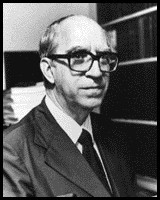Américo Jacobina Lacombe (1909-1993)

As you might know from his name, he was of French descent. His ancestors came to the Brazilian empire to teach the court to dance, continental style. Later the locale undoubtedly taught them the samba.
When I knew him (quite well) he was the Director of the Casa Rui Barbosa, the former home of the senator and golden orator of late nineteenth and early twentieth-century Brazil. Rui was a formidable politician from a well-placed family in the great state of Bahia.
Barbosa was highly educated, very learned, and very loquacious (he was the subject of many cartoons in that era). A favorite caricature featured his head (which was rather outsized) as a huge library full of books and the appropriate ladders to reach them. Underneath was the insertion: “O Maior Côco da Bahia” (“The Biggest Coconut of Bahia”). Another showed him driving a steam shovel to roll out a massive roll of paper, with frightened citizens in the distance (reference to his excessive speech making). The reader will not be surprised that he never made the presidency (the William Jennings Bryan of Brazil).
His casa was a very restful oasis on a quiet section of modern Rio. It is crammed with his library papers and his memorabilia. In the garage is his ancient sedan with very flat tires, just as his interlocutors might have often felt after a three-hour oration.
The casa was also a gathering place for many Rio writers, intellectuals, and historians. I learned a lot in their amiable presence. Also, Lacombe, an impeccable dresser, was an excellent raconteur. The servants in the casa—government-paid employees—from a federal research center (no Xerox machine, so you had to arrive with a full pen and a pocketful of notecards).
My publisher suggested that the Casa would be the perfect locale for the lançamento of my book, along with another book by a young (Brazilian) colleague. Lacombe was nervous since the publisher was quite to the left; Lacombe was of a very conservative turn of mind. So he insisted in giving both books a careful read before he lent his premises for any dubious purpose. This applied especially to me, since my book (by a gringo) was on the military overthrow of a left-leaning president. The Brazilian left thought the coup was the work of the CIA and I was the apologist. My friend perused it carefully (now the good version) and pronounced it objective, the casa was opened for hors d’oeuvres (French, of course) and a great time was had by many friends.
Further Readings
Lacombe, Américo. À sombra de Rui Barbosa. São Paulo: Companhia Editora Nacional/MEC, 1978.
Lacombe, Américo. Brazil: A Brief History. Rio De Janeiro: Ministry of Foreign Relations, Cultural Division, Publication Office, 1954.
Américo Jacobina Lacombe was born in the city of Rio de Janeiro. A successful lawyer and historian, he worked as secretary of the National Council of Education in 1931. He also served as Director of the Casa de Rui Barbosa, an organization focused on the preservation of national heritage, and contributed to the publication of Barbosa’s works. From 1985 to 1991, he acted as President of the Brazilian History and Geographical Institute.

